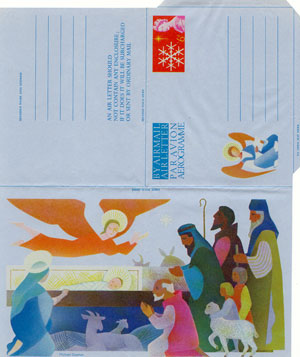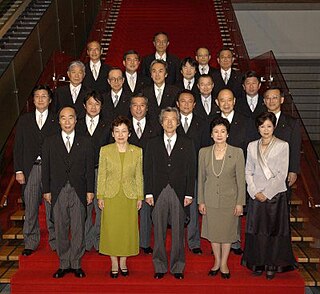
A post office is a public facility and a retailer that provides mail services, such as accepting letters and parcels, providing post office boxes, and selling postage stamps, packaging, and stationery. Post offices may offer additional services, which vary by country. These include providing and accepting government forms, and processing government services and fees. The chief administrator of a post office is called a postmaster.

The United States Postal Service (USPS), also known as the Post Office, U.S. Mail, or simply the Postal Service, is an independent agency of the executive branch of the United States federal government responsible for providing postal service in the United States, its insular areas and associated states. It is one of a few government agencies explicitly authorized by the Constitution of the United States. As of 2023, the USPS has 525,469 career employees and 114,623 non-career employees.
Telecommunications in Iraq include radio, television, fixed and mobile telephones, and the Internet as well as the postal system.
Post, POST, or posting may refer to:

Postal history is the study of postal systems and how they operate and, or, the study of the use of postage stamps and covers and associated postal artifacts illustrating historical episodes in the development of postal systems. The term is attributed to Robson Lowe, a professional philatelist, stamp dealer and stamp auctioneer, who made the first organised study of the subject in the 1930s and described philatelists as "students of science", but postal historians as "students of humanity". More precisely, philatelists describe postal history as the study of rates, routes, markings, and means.

A Canadian postal code is a six-character string that forms part of a postal address in Canada. Like British, Irish, and Dutch postcodes, Canada's postal codes are alphanumeric. They are in the format A1A 1A1, where A is a letter and 1 is a digit, with a space separating the third and fourth characters. As of October 2019, there were 876,445 postal codes, using forward sortation areas (FSAs), from A0A in Newfoundland to Y1A in Yukon.

An aerogram, aerogramme, aérogramme, air letter or airletter is a thin lightweight piece of foldable and gummed paper for writing a letter for transit via airmail, in which the letter and envelope are one and the same. Most postal administrations forbid enclosures in these light letters, which are usually sent abroad at a preferential rate. Printed warnings existed to say that an enclosure would cause the mail to go at the higher letter rate.

Investment in post-2003 Iraq refers to international efforts to rebuild the infrastructure of Iraq since the Iraq War in 2003. Along with the economic reform of Iraq, international projects have been implemented to repair and upgrade Iraqi water and sewage treatment plants, electricity production, hospitals, schools, housing, and transportation systems. Much of the work has been funded by the Iraq Relief and Reconstruction Fund, and the Coalition Provisional Authority.

The British Forces Post Office (BFPO) provides a postal service to HM Forces separate from that provided by Royal Mail in the United Kingdom. BFPO addresses are used for the delivery of mail in the UK and around the world. BFPO moved from its original base at Inglis Barracks, Mill Hill to its current base at RAF Northolt in west London in 2007.
This is a survey of the postage stamps and postal history of Iraq. It includes special uses under the Ottoman Empire as well as occupation issues.

The Canadian Union of Postal Workers is a public-sector trade union representing postal workers including letter carriers, rural and suburban mail carriers, postal clerks, mail handlers and dispatchers, technicians, mechanics and electricians employed at Canada Post as well as private sector workers outside Canada Post. Currently, comprising upwards of 50,000 members, the Canadian Union of Postal Workers has historically been labeled as militant because of some of the actions undertaken since its inception in 1965 to help guarantee rights to all postal workers. According to former president Jean-Claude Parrot, "We succeeded to get the support of the membership because we earned our credibility with them...we got that reputation [of militancy] because we earned it."

This is a survey of the postage stamps and postal history of Kuwait.

The Iraqi Telecommunication and Post Company (ITPC) is a government-owned and operated corporation responsible for providing telecommunication and mail services in Iraq.
Postal codes in Andorra were introduced in July 2004. As postal services in Andorra are run by Correos of Spain and La Poste of France, postal codes were introduced in cooperation with both countries' postal administrations. Each of the seven parishes of Andorra has its own post code.
In 2004 a new postal code system was introduced in Iraq.
Qatar was a British protectorate from 1916 till it gained independence on 3 September 1971. Until 1950, the country's postal service was administered by an Indian post office in Bahrain. A British office was opened in Doha and sold stamps of British Postal Agencies in Eastern Arabia until 1957 when overprinted British stamps were introduced. Qatar Post took responsibility for postal administration in May 1963 and joined the Universal Postal Union in January 1969. The first Qatari stamps were issued in 1961 and there was an independence issue in January 1972. Since then, Qatar Post has continued to manage the country's postal administration and to issue its stamps, which are mostly relevant to Qatar itself.

British postal agencies in Eastern Arabia issued early postage stamps used in each of Abu Dhabi, Bahrain, Dubai, Kuwait, Muscat and Qatar. Muscat and Dubai relied on Indian postal administration until 1 April 1948 when, following the Partition of India, British agencies were established there. Two agencies were opened in Qatar: at Doha and Umm Said. In Abu Dhabi, an agency was opened on Das Island in December 1960 and in Abu Dhabi City on 30 March 1963. The agencies also supplied stamps to Bahrain until 1960; and to Kuwait during shortages in 1951–1953.

The Second Koizumi Cabinet was the cabinet of Japanese Prime Minister Junichiro Koizumi during his second term from November 2003 to September 2005. The cabinet was formed after the coalition of the Liberal Democratic Party and the Komeito was re-elected with a slightly reduced majority at the November 2003 general elections. The LDP lost 10 of its pre-election seats to become a minority in the National Diet, but immediately regained a majority by absorbing its coalition partner, the New Conservative Party. Koizumi had reshuffled the cabinet less than two months before the election, and so made no changes when he was re-elected by the Diet on November 19.












